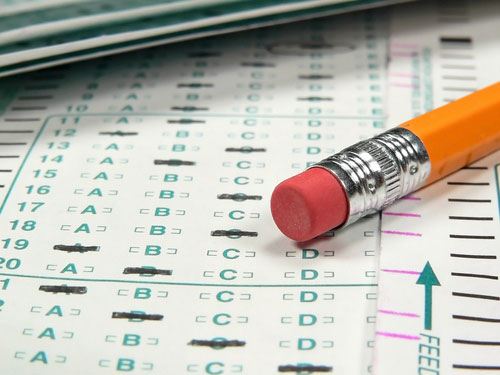Does the End Really Justify the Mean?

May 26, 2016
Another year passes, and another year of congratulations is owed to all those brave souls who soldiered the waves of classwork, the piles of tear-stained notes, the gallons of coffee and the hours of sleep deprivation that go into embarking through the dreaded two-weeks of the year that often matter the most to these ambitious students: AP testing. To all who did it without a (drastic) mental breakdown, we salute you, and offer you the grand condolence in the fact that you’re done with this particular stress for another year. Unfortunately, “grand” may not be the best choice of word for this reassurance; chances are that most of you driven AP students have already signed up for a handful of classes of a similar caliber next year, already lined up for the same patterns of determination or sluggishness– depending on the individual that you are– that you subjected yourself to this year. While the commendability of this zeal is undeniable, if asked, would you be able to give a justifiable reason to taking these challenging courses? Most would say for greater chance of success in college, a better-looking resume, or a credit to excuse them from some of the introductory courses in college. But if these students were told that this may not be the case would the courses still be worth it? This is where the question lies for millions of high school students, who are being asked to decide if the money they could save is worth the mental and physical cost of these AP courses.
Although you may feel, when preparing for these tests, that no one could have studied harder or gone through such a strain as you, high schoolers across America have faced the very same tribulation for over fifty years now. The idea to allow secondary schools to offer college-level courses wasn’t one introduced until World War II came to a close and U.S. educators advocated for “bridging the gap” between the secondary school and higher education. By 1952, these calls grew loud enough to be heard, and a pilot program of advanced courses in eleven subject areas was launched. The College Board, an esteemed “mission-driven not-for-profit organization” started in 1900, took over the program three years later, renaming it the College Board Advanced Placement Program. Bringing together college faculty and high school teachers in mixed committees, these groups began working together to define expectations of the course and develop a framework for the subjects and their exams, a practice these in which brain trusts still partake. Within the first year of their acquisition, 104 high schools and 130 colleges were participating in the curriculum, subjecting over a thousand students to twice as many exams. Within another ten years, the organization turned its focus to training high school teachers to teach the syllabus; by the 1990s, efforts to include more minority and low-income students in testing became a primary goal for the Board. As the tests are revamped and bettered each year, the breadth of test subjects, participants, and results made leaps. In the 2013 school year, over three million tests across 34 subjects were taken by about 33% of high school students, nearly doubling the percentage from ten years prior.
With figures showing an ever-increasing popularity for the tests and the courses, the fact that their worth is in doubt is one that comes as an initial shock to most. If they’re only established to aid students, why are there calls to reconsider enrollment altogether? The problem may lie in the students’ own drive to take the tests. As “advanced placement” implies, the courses are designed to act as a college substitute for those looking to get ahead. Most students pursue them in hope of coming to college with a competitive edge. Researchers have found a strong correlation between students who participate in both AP courses and exams and a higher GPA, more credit hours earned, and high four-year graduation rates in a study of over 200,000 Texas college students. The results are inconclusive, however, as to whether these AP courses were the factor for success. “Research is clear,” says College Board senior vice president Trevor Packer, “that students who take AP courses often do better in college. The question is whether or not these same motivated and high-achieving students would have done just as well in college without taking AP courses in high school.” Sandra Phills, AP critic and University of Alaska professor furthers the speculation, adding that “those who excel naturally at schoolwork are those who are most likely to enroll in AP classes and later do well at college.”
The notion has always been that this curriculum is structured to prepare students for the rigor of the university work that they’ll soon encounter after graduation, maybe even lend them the opportunity to opt out of the humdrum freshmen courses to which they’d otherwise be subjected. But schools are increasingly nullifying this credit; as the pursuit of advanced courses is rising, the quality control on the test may be slipping. Schools who would be expected to want the very best– prestigious universities like Harvard, Duke, and Brown, among others– are now writing off AP merit as a standard for applicants, and are now awarding no credit at all for the 4’s and 5’s of the test. And the suspicions aren’t unwarranted: Dartmouth, one of the first schools to announce their rejection policy of AP credit, acted upon these doubts to conduct a study that would evaluate just how much knowledge these advanced freshmen retained from their year in the classroom. Researchers asked one hundred incoming freshmen, all who blew away the competition and scored 5’s on their AP Psych exams, to take Dartmouth’s own Intro to Psych final– a seemingly easy task, as these students had all performed well enough to test out of the class altogether. “Seemingly” proved to be the keyword: 90% of students were unable to pass the test. “What used to be a demanding program,” says Frank Costas, Columbia University’s academic advisor, “is becoming a box to be checked along with building houses for two weeks in Ecuador and running for student council. It’s getting harder to tell if AP classes are still preparing students for the rigor of college or is it a victim of grade inflation like most other programs.” An increasing number of university reps agree, alleging that because more and more students are pursuing AP classes and test scores continue to rise, the test content and reputability of the exam may be falling. That’s not to say that all of your testing has been in vain; many university members still believe that credit is owed where it’s due. Admissions officer Tara Hall is one of those members, emphasizing that many of these same studies have “shown that students who excel in AP coursework outperform their counterparts at the university level. It’s hard to argue with that. If they know the material, we see no reason to deny them the credit.”
In large part, their worth can’t be based on a set number of cookie-cutter factors; the majority of these are individual to the student. While a solitary fee of $91 could save you the expense of a class that will cost you seven times that, the college and major you’re going for can dub the classes “fruitful or pointless.” As the Daily Californian recommends, your best course of action is checking in with your college to see what they award credit and what will apply to your major; if they’ll only take scores which you see as unattainable, or if passing your AP Chemistry test does nothing to help in your pursuit of an English degree. Though you may find your time in school truncated if you begin acquiring your degree with credit already earned, the advantages that the option offers may not even exist to start with. Denise Pope, a college success researcher and senior lecturer, testifies to the conjecture, confirming the “ongoing debate between those who claim a direct relationship between participation in AP courses in high school and academic success at the college level, and those who don’t believe there is a causal relationship. Champions of the AP program claim that students who take AP courses tend to earn better grades in college, work harder, take less time to graduate, and are generally more likely to succeed in college than are students who do not take AP classes.” In the same breath, she conceded that those observations could all be thanks to the nature of the students themselves. As for taking classes in the hopes of building a standout resume, that’s another unfortunate illusion in today’s world of education. “Illustrious” universities are, in part, made by the number of applicants it can afford to reject, the highest of which being able to brag of admissions between six and seventeen percent, and it’s these who “expect their potential students have engaged in demanding and enriching classes,” says Delores Thatcher, a New York school-placement specialist; “AP classes are designed to meet those expectations.” But this dignity itself is quickly becoming inadequate. “More and more every year,” explains Hall, “applications are looking more and more the same, so we have to make the process harder and harder. It’s not enough to have taken AP classes; you have to ace your AP classes.”
And thus, the debate rages on: to take on a year (or a few, in equal pressure) worth of stress in AP classes, or to avoid the strain altogether? Everyone in the world of academia– admissions officers, researchers, and past students all still stand on the fence. Upon reflection, Brigham Young University student Austin Drake mused that it depends on “what ‘worth it’ means to you. I just wish someone had told me how universities really look at AP classes. I don’t know that I would have done it differently… I probably could not have gotten into BYU without the AP classes, so I don’t know if they helped me or not.” Admission officer Hall furthered the caution of knowing your university’s standards, recommending that “unless they know they can perform on an outstanding level, receive top grades and keep up with the curriculum, I’d say students should reconsider taking AP classes. A mediocre grade in an AP class is a black mark on a transcript. It shows us the student isn’t ready.” Furthering the ambiguity, Pope advised “before taking an AP class, really think about your reasons for being there. Are you taking it because you’re passionate about the subject? Because you want to be challenged and be around intellectually challenging peers? If so, that’s great. But if you’re considering taking AP because it seems like it’ll make you a shoo-in for your dream school, don’t do it.” The choice is entirely yours, of course, and the best advice is looking at your own goals and ambitions before registering for classes. As Packer has said, the AP Program is “not a silver bullet. It’s not a simple cure for all the challenges we face…but [by] helping a diversity of students [who] engage in rigorous work worth doing, I find myself inspired daily by what they are achieving.” So the question remains: for you, will the ends justify the means of the course?



